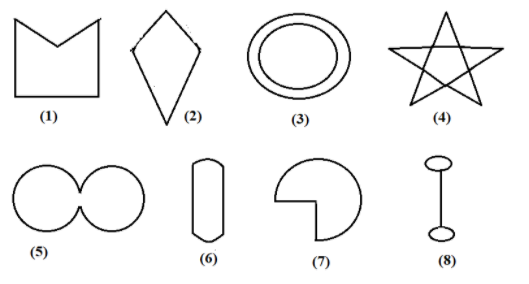
Given here are some figures:

Classify each of them on the basis of the following:
i) Simple curve
ii) Simple closed curve
iii) Polygon
iv) Convex polygon
v) Concave polygon

Answer
588k+ views
Hint:
Recall from the definition that a simple curve is a curve that does not cross itself, a closed curve is the one that starts and end from the same point. A polygon is made up of line segments and vertices. Also, if each interior angle of the polygon is less than ${180^ \circ }$, then it is a convex polygon and if one of the angles of a polygon is greater than ${180^ \circ }$, then it is a concave polygon.
Complete step by step solution:
We know that a curve is a simple curve when it does not crosses itself.
Here, the figures (1), (2), (5), (6) and (7) are simple figures.
Also, a simple curve which starts and ends with the same point is a simple closed curve.
Here, the simple closed curves are figures (1), (2), (5), (6) and (7)
Next, a polygon is a two-dimensional closed figure which has straight lines as sides and has vertices.
The figures (1) and (2) are polygons.
A polygon in which every interior angle is less than ${180^ \circ }$ is a convex polygon.
There is only one figure that has each of its interior angle less than ${180^ \circ }$is the figure (2)
Now, find the polygon with at least one of the interior angles greater than ${180^ \circ }$, which is known as a concave polygon.
Here, figure(1) represents a concave polygon.
Note:
When we move to higher studies, the meaning of closed curves, simple curves and smooth curves modified a little bit. Just to solve such problems one must know the definitions and know how to apply the definition.
Recall from the definition that a simple curve is a curve that does not cross itself, a closed curve is the one that starts and end from the same point. A polygon is made up of line segments and vertices. Also, if each interior angle of the polygon is less than ${180^ \circ }$, then it is a convex polygon and if one of the angles of a polygon is greater than ${180^ \circ }$, then it is a concave polygon.
Complete step by step solution:
We know that a curve is a simple curve when it does not crosses itself.
Here, the figures (1), (2), (5), (6) and (7) are simple figures.
Also, a simple curve which starts and ends with the same point is a simple closed curve.
Here, the simple closed curves are figures (1), (2), (5), (6) and (7)
Next, a polygon is a two-dimensional closed figure which has straight lines as sides and has vertices.
The figures (1) and (2) are polygons.
A polygon in which every interior angle is less than ${180^ \circ }$ is a convex polygon.
There is only one figure that has each of its interior angle less than ${180^ \circ }$is the figure (2)
Now, find the polygon with at least one of the interior angles greater than ${180^ \circ }$, which is known as a concave polygon.
Here, figure(1) represents a concave polygon.
Note:
When we move to higher studies, the meaning of closed curves, simple curves and smooth curves modified a little bit. Just to solve such problems one must know the definitions and know how to apply the definition.
Recently Updated Pages
Master Class 10 Computer Science: Engaging Questions & Answers for Success

Master Class 10 General Knowledge: Engaging Questions & Answers for Success

Master Class 10 English: Engaging Questions & Answers for Success

Master Class 10 Social Science: Engaging Questions & Answers for Success

Master Class 10 Maths: Engaging Questions & Answers for Success

Master Class 10 Science: Engaging Questions & Answers for Success

Trending doubts
What is the median of the first 10 natural numbers class 10 maths CBSE

Which women's tennis player has 24 Grand Slam singles titles?

Who is the Brand Ambassador of Incredible India?

Why is there a time difference of about 5 hours between class 10 social science CBSE

Write a letter to the principal requesting him to grant class 10 english CBSE

A moving boat is observed from the top of a 150 m high class 10 maths CBSE




